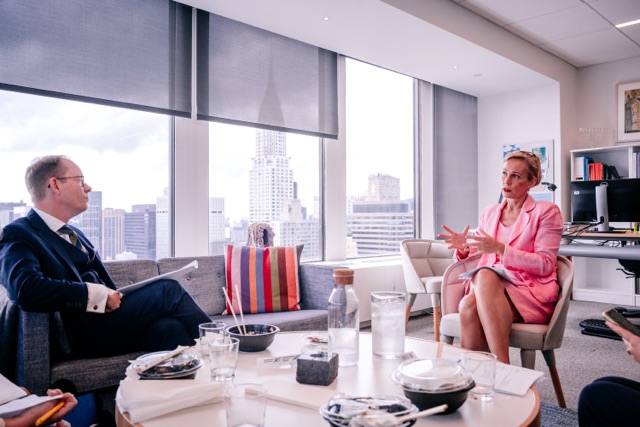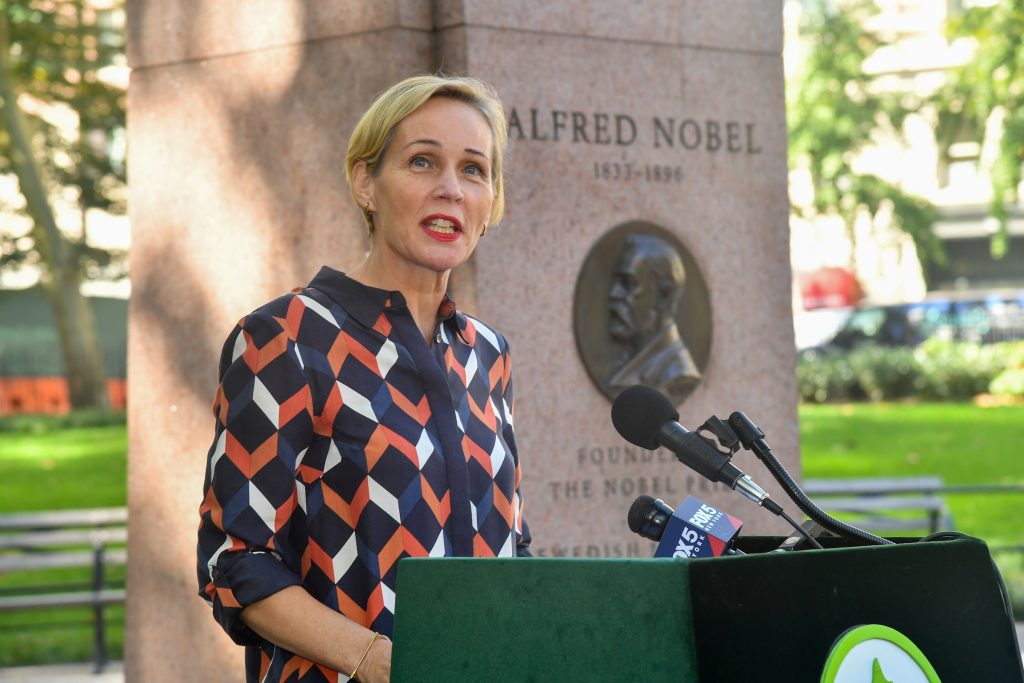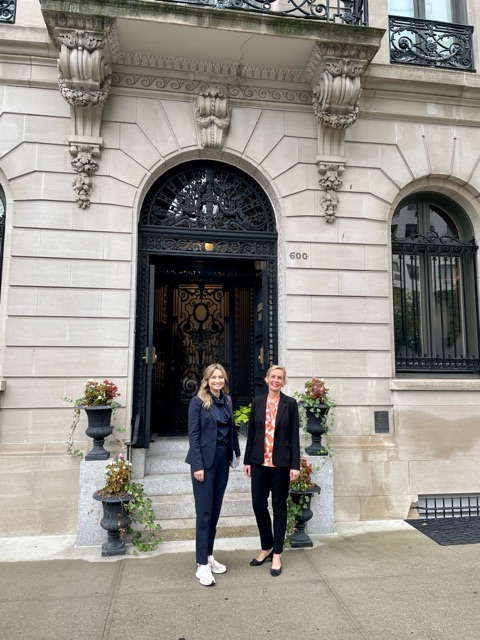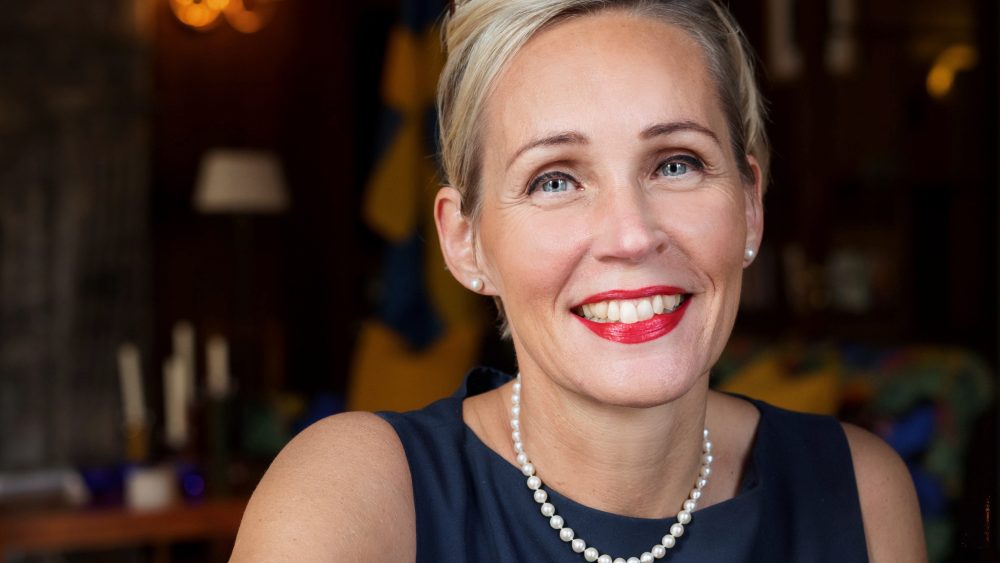Hi Camilla Mellander! You are an alumna from Lund University with a MSc in Economics and today you are appointed Consul General at the Consulate-General of Sweden in New York. Can you briefly tell us more about your career path from Lund to your current role? What inspired you to pursue a career in international relations and diplomacy?
I always wanted to work in an international setting since I was young. I think the fact that I spent a year at an American High school when I was 13 years old was very formative for me, it broadened my horizons. For a long time, I was dreaming of working for the UN but instead I applied for the diplomatic training program – nowadays called Diplomatprogrammet – at the Swedish Ministry for Foreign Affairs. I did this after I had finished my studies at Lund University and worked for a few years. In order to get accepted you have to pass a number of tests and show that you have a solid background in governance and international affairs but you also have to have language skills. I think I have always been driven by a sense of trying to make a difference and solve conflicts. For many years I was working on issues concerning the Middle East, first as desk officer at the Middle East department at the Ministry for Foreign Affairs in Stockholm, then as Deputy Head of Mission at our embassy in Tel Aviv and then as Political Advisor in Brussels to the EU Special Envoy to the Middle East. At that time there were ongoing Israeli – Palestinian peace negotiations modeled on the Oslo accords, and it felt like peace was within reach. Today the situation is different and it will take time to get the parties to go back to the negotiating table.
I have also worked at the UN department with peacekeeping missions and at the Consular department helping Swedes in need of assistance abroad. I have been ambassador to Vietnam for four years and I was the Head of the Department for Trade Promotion and Sustainability right before coming to New York. For a number of years, I was also working for the former Swedish State Secretary for Foreign Affairs Mr. Frank Belfrage, and during those years I learned a lot. He was fluent in five or six languages, had extensive knowledge about all international conflicts and was a very good negotiator. One of the best things about my job is that I have so many talented and inspiring colleagues, I think that’s one of the perks of this job.
What are the primary responsibilities of a Consul General, and how do they differ from other diplomatic roles?
Being Consul General is different from being an ambassador. As an ambassador you are responsible for the bilateral relation with a whole country and cover everything from political to economic, cultural and consular issues. As Consul General you cover a part of a country and in my case it’s New York state as well as all of New England, New Jersey and Pennsylvania, so it is nine states in total. My counterparts are the Governors of the different states as well as the Mayors of the different cities; New York, Boston, Philadelphia etc. In New York, with a population of 18 million people and almost double the size of Sweden, the administration of Mayor Eric Adams mirrors that of a government, so there is a Department for International Affairs, Department of Economic Affairs etc with which we interact.
Many times, there are similar challenges in our respective countries. For example, when Prime Minister Ulf Kristersson was here in September, he met with Mayor Eric Adams to discuss the challenges with organized crime. New York has had challenges with gang criminality years before Sweden and Mayor Eric Adams is a former policeman. It was a fruitful exchange.

As Consul General, I also focus a lot on business promotion and cultural promotion and we try to help Swedish companies as well as Swedish authors, film makers, designers and artists to succeed in New York. When it comes to business promotion we work as TeamSweden together with Business Sweden and the Swedish American Chamber of Commerce in New York (SACCNY) to try to help companies expand and grow on the American market. We focus a lot on the green transition where we are years ahead of the US and specifically on e-mobility, offshore wind and energy efficiency in buildings. We also focus on life science since we are covering Boston. I would love to see more companies from Ideon Science Park come to New York.
SACCNY has an office space for Swedish start-ups and scale-up companies called Gateway on Manhattan where Swedish companies can rent an office at an affordable price and have the benefit of being co located so they can share experiences and good advice on what to do and what not to do on the American market. For example, the company BrainLit, which was started at Ideon, has an office at Gateway and is selling their special lamps resembling daylight to big American arenas and workplaces. I think it’s fantastic. I was raised in Lund so I’m very proud of all companies that come from there. Nicorette is another company that has sprung out of Lund and which has helped people stop smoking all around the world, including in the US. Bluetooth is another invention from Ericsson in Lund that is being used every day by everyone who has a smartphone. We work a lot with Ericsson in New York as they are one of the main companies building out the digital infrastructure in the US.
Can you walk us through a typical day in your role as Consul General in New York?
I always walk to the office in the morning, those 20 minutes gives me time to think and structure my day. On Monday, for example, we will discuss an upcoming event with Lund University at the residence on November 30th. We do a yearly event with Lund University Foundation headed by Chairman and President Maria Tufvesson Shuck in New York. Last year we focused on cancer research. Mikael Dolsten, chief scientist at Pfizer and an alumnus from Lund University spoke alongside a number of the best cancer researchers from Lund. This year the focus will be on innovation and sustainable growth.
The Swedish bank SEB will be in New York next week hosting a CFO and CIO conference and I will be one of the speakers so I have made time in my calendar to prepare my speech focusing on New York’s role as the financial capital of the world. After that I will have a meeting about the upcoming Nobel dinner on 10 December. We organize an annual Nobel dinner where we invite former American Nobel laureates and this year, we will have no less than 26 Nobel laureates! Our chef at the residence, Simon Richtman from Gotland, will be looking at last year’s Nobel menu in Stockholm and take inspiration for this year’s Nobel dinner in New York. In the afternoon, I will attend a seminar at the Ukrainian Institute in New York on the destruction of Ukraine’s cultural heritage as a consequence of the ongoing war. In the evening, there is a reception hosted by my Indian college. That is more or less a typical day.

In what ways does cultural diplomacy play a role in your work, and how do you navigate cultural differences?
Cultural diplomacy is a very important part of the work. That part of the job is very inspiring and many of the best Swedish musicians, film makers, photographers, authors, designers, artists, opera singers and dancers come to New York because it is such an important cultural scene. Max Martin has a fantastic musical showing on Broadway right now called &Juliette, Ruben Östlund showed his film Triangle of Sadness at New York International Film Festival this spring, Jonas Hassen Khemiri just launched his latest book Systrarna (“The Sisters“) at the residence. As Consul General, I have the privilege of living in a fantastic residence on Park Avenue in Manhattan. This is where I live with my family but this is also where we do a lot of our events. Event space is extremely expensive in New York, so we are so blessed to have this beautiful house.

In connection to New York Fashion Week we had a fashion show in the residence with Swedish designer MaxJenny. We also work a lot with artists and had a screening of the artworks of Nathalie Djurberg and Hans Berg right before the summer, but we also try to support younger artists such as Lap See Lam who just had an exhibition in New York and Buffalo. We have a yearly reception for Swedish dancers and actors who are here for APAP and ISPA in January each year. We work together with Export Music Sweden to support young musicians in and this year Nea, Deki Alem and Graham Lake performed at a club in Brooklyn at an event called Sweden Makes Music.
There are some cultural differences between Sweden and the United States, but much less so compared to when I was ambassador in Hanoi. I remember when I was just a few weeks into my new posting and was trying to find time for a planning day with all staff at the embassy in Hanoi. I was looking at the calendar and found a date that looked good. I suggested it to the staff and they all looked down and uneasy. I sensed something was wrong and afterwards one of the colleges came up to me and explained. “It’s the stars, if you read the stars, you can see it’s a bad day and it means things could go terribly wrong”. I of course had to find another day. Those situations don’t arise here in New York and in many ways Swedish and American cultures are very close to each other and inspire each other. We listen to American music and watch American movies and vice versa. But we are still more shy than Americans and don’t like to brag and sometimes people here don’t understand why we are not better at selling ourselves and getting our message through.
How did your experiences at Lund University contribute to your professional development?
I moved to Lund when I was 4 years old and my father Stefan Mellander became Professor of Physiology at the Faculty of Medicine at Lund University. Growing up in Lund was a privilege. Everything is centered around knowledge and learning and despite its rather small size, it is a very international city thanks to the university. So, I think it’s fair to say that the university shaped me already at a young age and maybe that’s where I got my interest for international affairs. Another thing that is so fantastic with Sweden is that university studies are free and that means it is possible to study anything that interests you, and me and all my friends followed our hearts. I, for example, studied Middle Eastern studies alongside political science and economics, but never thought I would be able to work with anything related to that, but then it turned out that I would be working with exactly that for almost ten years. Being a diplomat, it’s also been very helpful for me to have the background in political science and economics.
What advice do you have for students or alumni aspiring to pursue a career in diplomacy? Are there specific skills or qualities that you believe are crucial for success in the field of diplomacy?
First of all, follow your heart because if you study something you are really interested in, you will excel. If you want to become a diplomat, you should first get some work experience, because very few get accepted straight out of university. Study languages because language skills are important.
Some students apply for internships at the Ministry for Foreign Affairs and at our embassies their last semester of their university studies. That is a good way of testing if diplomacy is something for you. At the Consulate General in New York, we have an intern every semester and the Ministry for Foreign Affairs works closely with all Swedish universities. The internship is unpaid but gives a very good working experience.
Read up on what’s required for applying to the diplomatic training program and prepare yourself by doing some of the tests from previous years. Once you’re accepted, the Ministry for Foreign Affairs is a fantastic place to work, not maybe so much for the money but for the experiences you get. You will have the choice of working at about 100 different embassies around the world and about 25 different departments back home at the Ministry for Foreign Affairs.
What is your fondest memory from your student days in Lund?
There are so many fond memories. I had so much fun at the Lundakarnevalen every fourth year. For some time, I was part of Utrikespolitiska Föreningen and that was a good experience. I attended many interesting student evenings – Studentaftnar – with different speakers at Akademiska Föreningen. I loved going to the Gustav Adolf ball organized by Göteborgs nation on 6 November every year, that was literally a party that went on for three days in a row. And I love Studentsångarna and Toddydagen. Or just walking through Lundagård.
Me and my husband Richard, who also studied in Lund, are happy that our two children Anna and Axel have chosen Lund University for their studies. Our daughter Anna started Läkarlinjen – medical school – in August this year and Axel will be studying economics as of January next year. So, we have many reasons to come back to Lund often over the years to come.

